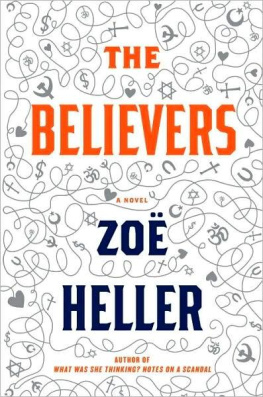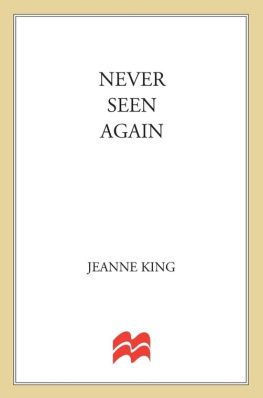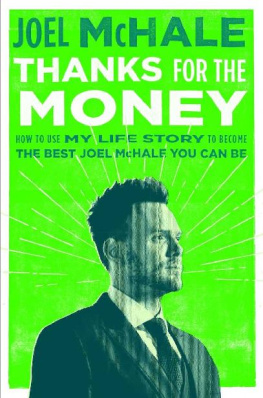The Believers
Zoe Heller

For Mary Parvin
The challenge of modernity is to live without illusions and without becoming disillusioned.--Antonio Gramsci
Contents
At dawn, on the top floor of a creaking house...
Audrey was sitting in an airy, book-lined living room on...
The buoys in New York Harbor were flopping and bouncing...
For an hour or so, Lenny and Karla had been...
"Mrs. Audre-ey!"
Standing at the corner of Forty-seventh Street and Fifth Avenue,...
Somewhere in the Columbia Presbyterian geriatric ward, a woman was...
"Lenny, have you seen my bag?"
The Jewish Women's Learning Center was located on the ground...
Karla was sitting in her office cubicle, examining a thick...
"Audrey, dear, you don't have to do this," Jean said,...
Raphael and Rosa sat on plastic chairs in the GirlPower...
Karla lay on her bed, sucking messily at a nectarine...
On the second Tuesday in July, Carol conducted the first...
"Tanya's all for sending him to some retreat in Arizona,"...
To lend some semblance of truth to the boast of...
Karla woke up agitated, mystified. She turned off her alarm...
"Thank you for coming in this afternoon," Dr. Krauss said,...
A deer stood at the bottom of the long, sloping...
"Welcome," Berenice said, standing in the middle of her living...
Rabbi Reinman held up a pomegranate. "Esther, can you tell...
One blue-skied morning in October, Susan Sarandon stood on a...
When Karla woke at six, Mike was already up and...
"I'm not being funny or anything," Audrey's sister, Julie, said...
At a party in a bedsit just off Gower Street, a young woman stood alone at the window, her elbows pinned to her sides in an attempt to hide the dark flowers of perspiration blossoming at the armholes of her dress. The forecast had been for a break in the weeklong heat wave, but all day the promised rain had held off. Now, the soupy air was crackling with immanent brightness and pigeons had begun to huddle peevishly on window ledges. Silhouetted against the heavy, violet sky, the Bloomsbury rooftops had the unreal, one-dimensional look of pasted-on figures in a collage.
The woman turned to survey the room, wearing the braced, defiant expression of someone trying not to feel her solitude as a disadvantage. Most of the people here were students, and aside from the man who had brought her, she knew no one. Two men had separately approached her since she had been standing at the window, but fearful of being patronized, she had sent them both away. It was not a bad thing, she told herself, to remain composed on the sidelines while others grew careless and loud. Her aloofness, she fancied, made her intriguing.
For some time now, she had been observing a tall man across the room. He looked older than the other people at the party. (Casting about in the exotic territory of old age, she had placed him in his early thirties.) He had a habit of massaging his own arms, as if discreetly assessing their muscularity. And from time to time, when someone else was talking, he raised one leg and swung his arm back in an extravagant mime of throwing a ball. He was either very charming or very irritating: she had not yet decided.
"He's an American," a voice said. Audrey turned to see a blond woman smiling at her slyly. She was wearing a violently green dress and a lot of recklessly applied face powder that had left her nose and chin a queer orange color quite distinct from the rest of her complexion. "A lawyer," she said, gesturing across the room at the tall man, "His name's Joel Litvinoff."
Audrey nodded warily. She had never cared for conspiratorial female conversation of this sort. Its assumption of shared preoccupations was usually unfounded in her experience, its intimacies almost always the trapdoor to some subterranean hostility. The woman leaned in close so that Audrey could feel the damp heat of her breath in her ear. The man was from New York, she said. He had come to London as part of a delegation, to brief the Labour Party on the American civil rights movement. "He's frightfully clever, apparently." She lowered her eyelids confidentially. "A Jew, you know."
There was a silence. A small breeze came in through the gap in the window where it had been propped open with books. "Would you excuse me?" Audrey said.
"Oh!" the woman murmured as she watched her walk away.
Pressing her way through the crowd, Audrey wondered whether she had dealt with the situation correctly. There was a time when she would have lingered to hear what amusing or sinister characteristic the woman attributed to the man's Jewishness--what business acumen or frugality or neurosis or pushiness she assigned to his tribe--and then, when she had let the incriminating words be spoken, she would have gently informed the woman that she was Jewish herself. But she had tired of that party game. Embarrassing the prejudices of your countrymen was never quite as gratifying as you thought it would be; the countrymen somehow never embarrassed enough. It was safer, on the whole, to enjoy your moral victory in silence and leave the bastards guessing.
Audrey halted now, at the sound of someone calling her name. Several yards to her left, a stout red-haired youth was standing between two taller men in an unwitting turret formation. This was Martin Sedge, her date for the evening. He was waving and beckoning, making little smoky swirls in the air with his cigarette: "Audrey! Come over here!"
Audrey had met Martin three months before, at a conference of the Socialist Labour League in Red Lion Square. Despite being one year her junior, he was much more knowledgeable about political theory--much more experienced as an activist--than she was, and this inequality had given their friendship a rather pedagogical cast. They had been out together four times, always to the same grimy pub around the corner from where Audrey worked, and on each of these occasions their conversation had swiftly lapsed into tutorial mode, with Audrey sipping demurely at her shandy, or nibbling at a pickled egg, while Martin sank pints of beer and pontificated.
She did not mind being talked at by Martin. She was keen to improve herself. (On the flyleaf of the diary she was keeping that year, she had inscribed Socrates' words, "I know nothing except the fact of my ignorance.") There was a girlish, renunciatory streak in her that positively relished Martin's dullness. What better proof could there be of her serious-mindedness--her rejection of the trivial--than her willingness to spend the spring evenings in a saloon bar, absorbing a young man's dour thoughts on the Fourth International?
Tonight, however, Martin seemed at pains to cast off his austere instructor's persona. In deference to the weather and to the festive nature of the occasion, he had forgone his pilled Shetland sweater in favor of a short-sleeved shirt that revealed his pink, ginger-glazed forearms. Earlier in the evening, when he had met Audrey at the Warren Street tube station, he had kissed her on the cheek--a gesture never hazarded before in the short history of their acquaintance.
"Audrey!" he bellowed now, as she approached. "Meet my mates! Jack, Pete, this is Audrey."
Audrey smiled and shook Jack and Pete's wet hands. Up close, the three men were a small anthology of body odors.
"You out of drink?" Martin asked. "Give me your glass, and I'll get you another. It's bedlam in that kitchen."
Left alone with Audrey, Jack and Pete fixed her with frankly assessing gazes. Audrey glanced away shyly. Some of the more daring girls in the room had removed their stockings, she noticed. She could see their poultry-white legs flashing into and out of the party's undergrowth, like torchlight in a forest.
Next page









